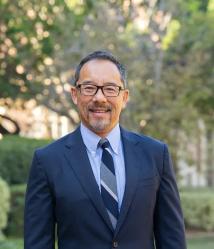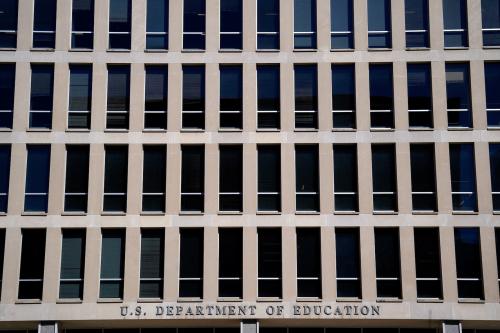

2:00 pm EDT - 3:00 pm EDT
Past Event
In October, the Supreme Court heard two cases on the use of affirmative action in college admissions, otherwise known as race-conscious admissions. The Court is expected to issue their decision in June, with many experts predicting that the outcome will severely limit, if not eliminate, the use of race-based affirmative action in college admissions. While some states have banned affirmative action for years, most colleges across the country will likely face a different admissions landscape this fall.
On May 23, the Brown Center on Education Policy at Brookings hosted a virtual event with leading education experts to explore the history of affirmative action in higher education, how affirmative action fits in a broader system of admissions criteria, and the impact of the Supreme Court’s decisions on college enrollment.
Katharine Meyer, a fellow at the Brown Center, moderated the discussion and set the stage by highlighting the precedent-setting opinion in the 2003 case Grutter v. Bollinger that allowed schools to consider “race in admissions decisions to further a compelling interest in obtaining the educational benefits that flow from a diverse student body.” Former Justice Sandra Day O’Connor noted that the court expected “racial preferences will no longer be necessary” within 25 years of their decision. However, defendants in the two recent cases (Students for Fair Admissions, Inc. v. University of North Carolina and Students for Fair Admissions Inc. v. President & Fellows of Harvard College) argued that the nation had not yet reached a point where the level of diversity desired (by institutions and by society) on campus will occur absent the direct consideration of race in admissions decisions.
Meyer began the conversation by prompting the panelists to outline what it means for a college to engage in affirmative action in their admissions review processes.
Dr. Kelly Slay, assistant professor of higher education and public policy at Vanderbilt University, indicated that affirmative action started in the workforce and, by the late 1960s, was adopted by institutions of higher education to “address a long-standing history of racial discrimination.” Dr. Slay went on to state that, despite challenges, the courts have consistently ruled that race-conscious admissions can be used when a compelling interest is identified.
Dr. Mitchell Chang, Associate Vice Chancellor at the University of California, Los Angeles, added that “race conscious admissions is currently applied in very limited ways.” Dr. Chang noted that a handful of states have banned the practice and that it is only applied in a sliver of highly selective colleges that receive more applications than they can admit, tipping the scale for highly qualified applicants from underrepresented groups. He went on to highlight that legacy admissions have a stronger positive effect on admission chances than affirmative action.
Dr. Meyer then turned the conversation toward the key legal questions at play in these two cases.
Professor Cara McClellan, director of the Advocacy for Racial and Civil Justice Clinic and Practice Associate Professor of Law at the University of Pennsylvania Carey Law School, said that the courts previously have stated that it is illegal to have quotas but have affirmed that race can be considered as one of many factors—as long as its use is “narrowly tailored.” It cannot be the determining factor for admission, and minority applicants cannot be insulated from competition, as students to which affirmative action can be applied are already in the pool of highly qualified applicants. McClellan went on to indicate that under the current legal precedent, race can be considered to pursue the educational benefits of diversity and bolster critical thinking and classroom discussion.
The panel then discussed the differences between the Harvard and UNC cases, the issue of “standing” necessary to bring matters before the court, and the different rulings the court could issue on the cases before them.
When Dr. Meyer asked the panel about their thoughts on the impact on campus diversity if affirmative action is declared unconstitutional, the panel of scholars expressed concern.
Dr. Chang stressed that institutions are eager to defend race-conscious admissions because they want to remain “legitimate in the eyes of society,” and cited analyses showing that the reduction in admissions, especially for Black students, will be significant.
Dr. Slay said that the reductions in enrollment are not about students not being successful but instead about making choices about where they want to attend—namely, institutions that they perceive to be more diverse or inclusive.
Professor McClellan highlighted the misconceptions associated with the barring of race-conscious admissions with fairness and neutrality. White and wealthy students disproportionally benefit from standardized tests, having highly educated parents, and having access to more resources throughout their educational journey.
The conversation continued focusing on other policies that can be used to address the issue of access to higher education and how admissions officers are preparing for a future without race-conscious college admissions.




Jon Valant
July 1, 2025

Dominique J. Baker
June 25, 2025

Nicol Turner Lee, Josie Stewart
June 23, 2025